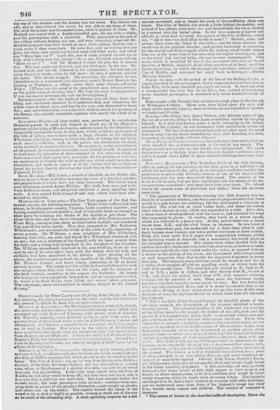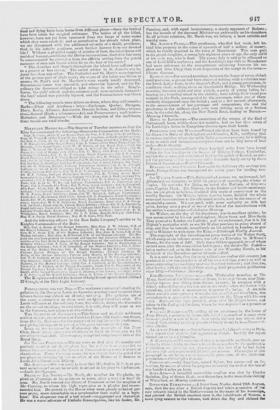Omretor s—As Sir Peter Laurie was alighting from his gig,
on Mon- 2ay morning, his foot got entangled in the reins, and he was thrown to the ground, by which his knee was severely CiAltItSCd. EFeECTS or LI:ilLTNINCi.-011 ‘I-(Alliesday evening- about eight o'clock, the metropolis. and its vicinity for several miles round, were visited with continual and vivid flashes of lightning-, with distant peals of thunder. On Thursday morning, some milkmen going to milk their cows, dis- covered three of them dead under a tree, in a field between Hendon and Ilampstead. At Edgware, a valuable horse was struck dead in a wuigeon sn its road to London. The houses in the vicinity of Battle-bridge were completely inundated, from the torrents of rain that rushed down from Hampstead and Highgate. A large lire-ball fell in Portland Town, Regent's Park, but fortunately without doing any injury. Several large trees in Kensington Gardens are entirely stripped of their leaves by the effects of the lightning. Coemstox 01, STZAM-VuSZI.S.-011 Saturday night between twelve and one o'clock, a collision took place between the Leeds steam-boat and the City of Dublin steam-packet, which proved nearly destructive to the latter. The City of Ftsbiin was on her way from Liverpool to Dublin : shelled, at the time, her lamps lighted, and was proceeding at a rapid rate, when, at the distance of a quarter of a mile, another steam-vessel was seems fast approaching. Loud cries were raised from the City of Dublin for the other vessel to keep off; but they were not heard, and it was seen that a collision was inevitable. For some minutes before the vessels struck, the male passengers were on deck ; numbers were run- ning about in a state of the greatest distraction ; some caught up planks, and others ran s:p the ladder. The captain desired the steam of the vehel to be worked as highly as possible, to keep as much out of the way as hecould of the advancing ship. A most agonizing suspense for a few
seconds succeeded, and: at length the crash of the conflioting ships waS. heard. The City of Dublin was struck a little behind the-paddles, and several of her planks were stove its ; and immediately the waves dashed.
in a torrent into the ladies' cabin. In the first moment of horror and affright at what had occurred, the captain of the City of Dublin called.
out, "All is lost—we shall all go to the la,ttom ! " Shrieks, cries, and
groans burst from the ladies in the cabin ; and for many minutes the vessel was in the greatest disorder, each person lamenting or preparing for the mortal and final struggle which the sinking vessel would expose him to ; at the same time it was seems that the engine was stopped, and as the vessel had lost her helm, she was become unmanageable. This scene, which is described by two of the passengers who were on board the City of Dublin, lasted for about three quarters of an hour, until the Leeds steam-boat, by which the damage had been done, returned to the City of Dublin, and conveyed her safely back to Liverpool.—Dublin Morning Register.
FALSE ALast3t.—A t the period. of the loss of the Rothsay Castle, a. report prevailed in the newspapers, that a steam-packet had been lost on:
Lake Erie, with seven hundred passengers on board. It turns out that a steam-packet has beers lost on the lake ; last, instead of containing seven hundred passengers, it contained only seven hundred barrels of flour.
Finn- DAMP.—On Tuesday last, an explosion took place in the low pit at Willington Colliery. Three men were killed upon the spot, and many others severely injured, some of whom are not expected to recover. —Sunderland Gazette.
Susema—On Friday last, James Vernon, only thirteen years of age, the son of a sawyer, living in Dee Lane, committed suicide by hanging himself. It is said that having taken a knife belonging to his father, and sold it for a penny, he was threatened with punishment unless he returned it. The fear of chastisement had such an effect upon his mind that he went into the house immediately, and, after fastening the door, committed the fatal deed.—Chester Costrani.
MUNE FliZES AT CONSTANT1NOPLE.—Accounts have been received of an- other dreadful fire at Constantinople at the end of last months. The Royal arsenal was set lire to, but the fire was extinguished. The great destruction was at Galata, where the valuable English warehouses are ; and it is stated above 1,0013 of those valuable buildings have been con- sumed.
Dee:seems HIJIMICANE.—The Barbadoes Globe of the bids August, after an apology for not printing on the 14th, gives in a half-sheet—all which the resources of the office, in its deranged condition, enabled the proprietors to print—the following account of one of the most terrible hurricanes that has ever devastated that island. The number of the dead, it will be seen, had not been ascertained, nor the extent of the pe- cuniary losses calculated : both must have been very great. The island was in the utmost want of provisions and shelter when the accounts came away. " The appearance of Wednesday evening (the 10th August) was in- dicative of unsettled weather,and manypersons prognosticated that there- would be a gale before the mornings but few anticipated a visitation so dreadful. The wind was at times rather high, and about ten o'clock there was a shower of rain, which was succeeded by a calm. After this, a dense mass of clouds gathered over the horizon, and remained for some time suspended in gloom. At twelve, they burst in a severe squall, which was followed by a heavy rain. At this period there was a smart breeze from N.E., and the wind began to increase. In two hours it blew a tremendous gale, but moderated for a short time, when it sud- denly became more violent, and was a perfect hurricane at three o'clock. From this hour until five it raged with unparalleled violence, whilst the lightning would at intervals cast a momentary but horrid glare on the mangled objects around. The houses were either levelled with the earth or unroofed ; the]argest trees torn from their roots, or broken as reeds. Numerous individuals were buried under the ruins, or exposed without a shelter to the pelting of the storm, and threatened with instant death at each successive blast that hurled the shattered fragments in every direction. The majestic cocoa-nut-tree would be tossed to and fro as a withy, then snapped off with an appalling crash, or driven from the earth with terrific force. The wind had now veered to E., back to N. and to N.W. ; again it shifted, and blew fiercely from E., veered to S.E., and ;about six o'clock burst from S.W. with renewed violence, accompeuied by torrents of rain. Once more the hurricane raged, but these was little standing to enceunter its fury. For two hours the wind and rain continued thus ; and it is easier to conceive than to de- scribe the suffering of those unfortunate beings who were all this time destitute of even the slightest shelter to screen them from the contend. ink; elements. " When the light of day dawned through the dreadful gloom of the subsiding tempest, the devastation of the country exhibited a heart- rending picture. The dreadful howling, of the winds and the crashing of the falling ruins having ceased, the shrieks of the affrighted, and the groans of the wounded and dying, broke in mournful sounds and piti- able accents on the cars of the less unfortunate survivors. Those who Lau! sufficient strength remaining*, commenced a sorrowful search for the reseeetive members of their fiunilies, some of whose lifeless bodies were disinterred from the ruins to be transferred to another grave, whilst mangled forms of others were dragged farth, frightful from their bruises, end making the hearts of their sympathizing relatives bleed with an- guish. The fields which the day before presented so luxuriant an ap- pearance were completely changed into a desert—neither canes, corn, nor provisions, with a few inconsiderable exceptions, having been left in the ground. The houses as well :Is windmills were thrown down, parts of them conveyed to an astonishing distance, and costly furniture de- strovvd or materially injured. Oistins', Hole Town, Speight's Town, and Bridgetown, have all suffered equally, there not being a single house in the island standing muinjured. A few, certainly, are only partially dameged ; but many which at first sight appear to have escaped, are found, on closer examination, to be in a condition that would be immi- nently dangerous either in heavy rains or strong winds. The barracks and hospital at St. Anus's have suffered in common with other buildings, and we understand more than forty of his Majesty's troops lost their lives, besides many women and children. The number of wounded is immense.
" The scenes of horror in the churches baffivall destription. There the
dead and dying have been borne from difkrent places—there the bruised have been taken for surgical assistance. The bodies of all the killed, however, have not yet been recovered from the heaps of stone under which they were crushed and as putrefaction has already taken place, we are threatened with the additional calamity of a deadly pestilence, God, in his infinite goodness, avert further horrors from our devoted isle ! Without a plentiful supply of articles of food, the inhabitants will perish of hunger,—without the Divine interposition, their dire fate must be consummated by contagion from the effluvia arising from the putrid carcasses of men and beasts which lie on-the face of the earth ! " The churches and chapels throughout the island have suffered each to a greater or less extent. The sacred edifice in St. James's was in- jured less than any other. The Cathedral and St. Mary's were deprived of the greater part of their roofs; the outran of the latter was blown to atoms; St. Paul's and St. Matthew's were nearly totally destroyed. Government-house was unroofed, and otherwise injured. and his Ex- cellency the Governor obliged to take refuge in the cellar. King's- house, the girls' school, and the common gaol, were seriously damaged : the boys' school was partially injured, and the Custom-house was blown down. " The following vessels were driven on shore, where they still remain : Barks—Irlam and Arethusa ; brigs—Exchange, Quebec, Decagon, Mary, Kezia, Alliance, Antoinette. Horatio Nelson, and Eliza ; brigan- tine—Samuel Hinds ; schooners—Ark and Perseverance; mail-boats- Barbadoes and Montague."—With the exception of the mail-boats, these vessels are total wrecks.



























 Previous page
Previous page